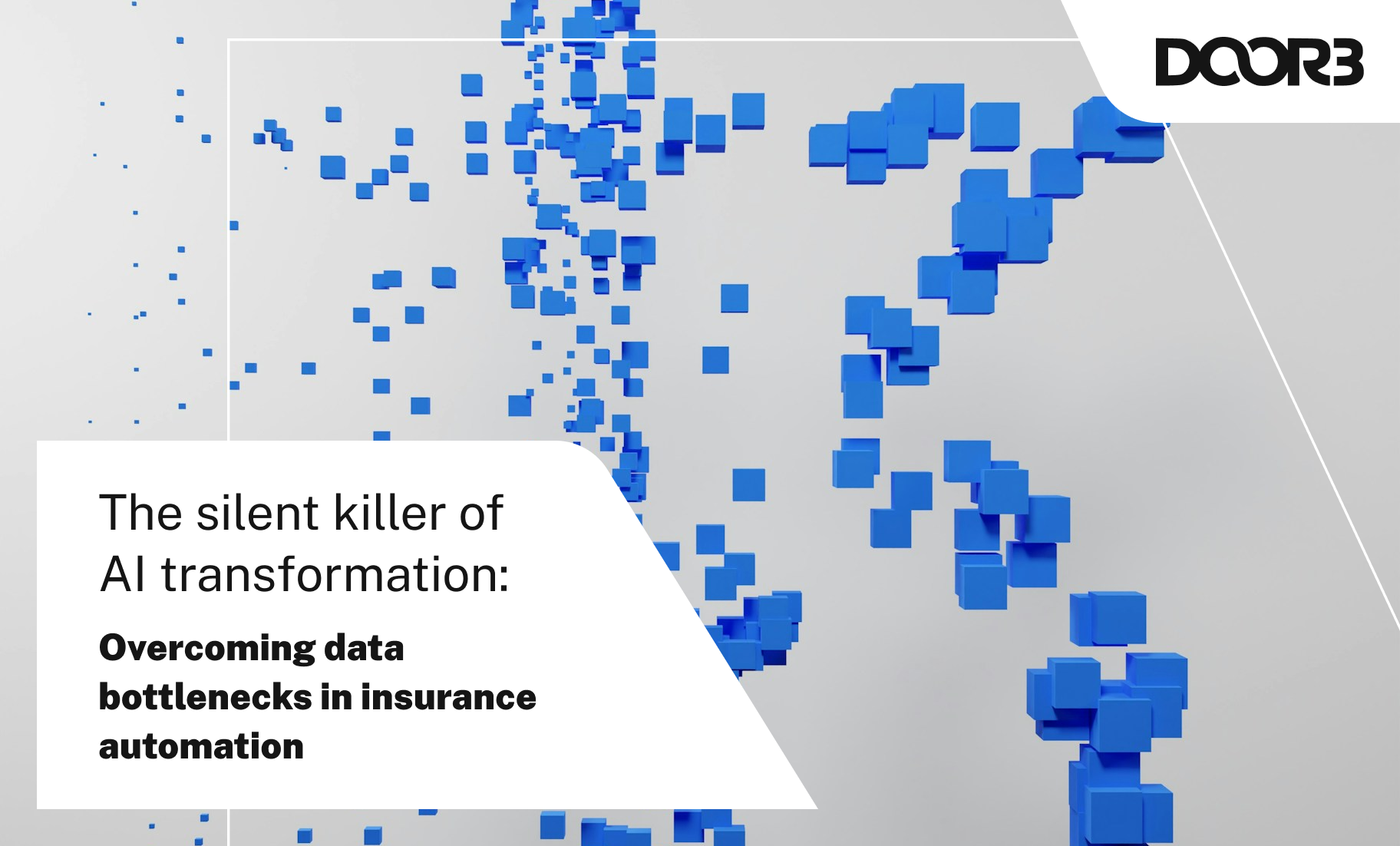10 Types of Software Development You Need to Know
07.16.2021As the software development industry and technologies in software development continue to grow rapidly, so does the different of types of software development.
The growth will continue as more organizations embrace digital transformation. Companies are adopting different types of software development solutions required to shift to virtual environments and to stay competitive because of ever evolving software development technologies.
IT spending is expected to reach 4.71 trillion U.S. dollars worldwide in 2023. That’s a growth of 4.2% from the previous year. This growth is partly driven by the post-pandemic widespread adoption of different types of software development technologies for digital transformation.
From powering mobile applications to managing complex enterprise systems, the demand for skilled software developers continues to soar. However, software development is not a monolithic field; it encompasses various methodologies, tools, and domains. Understanding the different software development types is crucial for both aspiring developers and businesses seeking tailored solutions.
Whether you’re a startup or a large enterprise, considering multiple types of software development and selecting the one best suited to you is crucial for achieving your business goals. From custom software development to legacy application modernization, we’ll cover the most popular types of software development technologies and how they can benefit your business.
What is Software Development?
Software development covers all the processes involved in creating and maintaining applications, frameworks, or other software parts. These processes range from software design, code writing, deployment, bug fixing to testing and quality assurance.
“Software development refers to a set of computer science activities dedicated to the process of creating, designing, deploying and supporting software” - IBM Research.
Why is Software Development Important?
Software development is essential for business success. It enables companies to develop enterprise design systems and solutions for their clients. With different types of software development, you can bring feature-rich technology products to the market, enhance customers’ experience, and simplify the day-to-day running of your organization. Software development enables companies to create custom-tailored digital experiences to meet their needs.
These types of software development solutions range from mobile apps development, e-commerce stores, web technologies, cloud infrastructure, business process management (BPM) software to enterprise resource planning (ERP) software, security programs, and customer relationship management (CRM) software. There are different types of software companies who specialize in each category.
What are the Different Types of Software Development
Here’re the 10 different types of software development:
-
Mobile Development
-
Web Development
-
Enterprise Software Development
-
DevOps Engineering
-
Security Software Development
-
Software Tools Development
-
E-commerce Development
-
Cloud Computing
-
Data Science
-
Database Development
1. Mobile Development
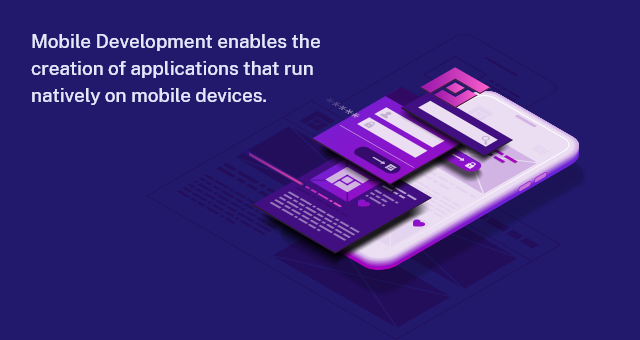
Mobile development is one of the many different software development types, and enables the creation of applications that run natively on mobile devices like smartphones, tablets, smartwatches, etc. Mobile developers have specialties - which are based on popular mobile operating systems.
According to Statista, Google Android and Apple iOS possess over 99% of the global market share of mobile operating systems as of October 2023. Consequently, developers usually specialize in either Android or iOS mobile development, as both these types of software development jobs have different specializations. However, developers can build applications that run both on Android and iOS devices from a single codebase with cross-platform application development tools.
Required Skills & Tech Stack
Android Development
The following are some of the key technologies used to develop Android applications:
-
Java: Java is the key programming language used in Android development. It’s an object-oriented language, just like JavaScript and Ruby.
-
Kotlin: has emerged as a popular alternative choice for developers due to its modern features and ease of use.
-
Android SDK: Android Software Development Kit provides developers with pre-packaged codes for mobile device functions.
-
Android Studio: It’s the integrated development environment for Android developers. It features top-notch capabilities such as auto-complete features, memory monitors, and code debuggers.
iOS Development
The core technologies you need are:
-
Swift: This is the programming language used in iOS mobile app development. The creation of a good iOS app requires proficiency in Swift.
-
Apple’s Xcode IDE: The Xcode IDE enables developers to create an excellent app. It also offers a great user experience.
Cross-Platform Development
Some of the different types of software development technology run both on Android and iOS devices. Cross-platform development is less expensive than native apps. In addition, it takes less time to develop.
The downside, however, is that native apps are provided more support by platform’s owner and are more optimized than cross-platform programs. Development platforms such as React Native, .Net MAUI, Ionic, Flutter, and Framework 7 provide the codebases of these types of software development jobs when developing cross-platform apps.
2. Web Development
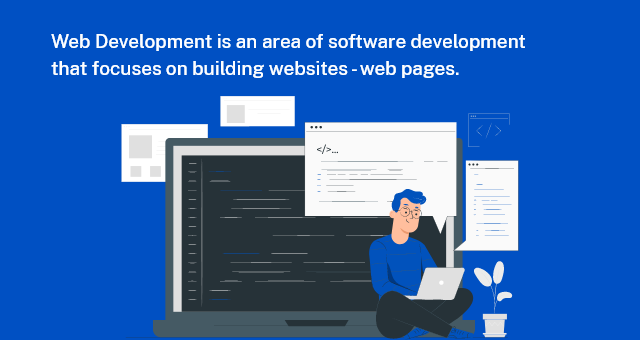
Web development is one of the types of software development and focuses on building websites - New web technologies and APIs enable developers to create more feature-rich web pages using plug-ins and web apps that feel native in contemporary browsers.
Required Skills & Tech Stack
Front-end Development
The front-end development requires proficiency in the following tools: HTML, CSS, Angular, React, Vue.Js, Svelte and JavaScript. Knowing how to use graphic design tools is also necessary for web related types of software development jobs.
Recommended: Click here to read our (DOOR3) UI & UX/Front End Dev case study - bringing mission-critical business software into the 21st century.
Related: Front-End Development Trends and Best Practices
Back-End Development
Some of the technologies required for back-end development include .NET, Javascript/NodeJS, Python, Ruby, Java, and PHP. Note: A developer mustn’t know all the server-side programming languages listed here, as many types of software development jobs can be addressed using different languages.
3. Enterprise Software Development
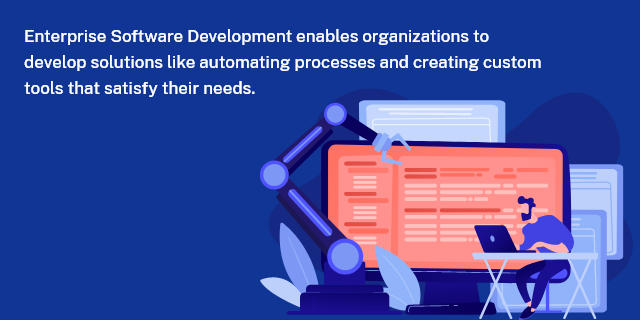
Enterprise software is a broad term for technology solutions organizations create for their operations. IT spending on enterprise software was about 783 billion U.S. dollars in 2022, increasing 7.1% from 2021. and expected to increase in 2023 as well.
The types of software development for enterprises enable organizations to develop solutions like automating processes and creating custom tools that satisfy their needs.
Legacy system migration is also a crucial part of enterprise software systems. While they may have been cutting-edge when first developed, these legacy systems can become outdated and slow over time, affecting business productivity and efficiency.
Legacy application modernization can help organizations stay competitive by improving outdated applications, integrating them with modern systems, and leveraging the latest technologies to improve business operations. This can result in cost savings, improved security, enhanced customer experience, and increased productivity, making modernization a worthwhile investment for any organization seeking to stay ahead in today’s fast-paced business environment.
Related: 4 Reasons to Conduct Legacy Migration: Unlock Potential
Required Skills & Tech Stack
The tech stack and skills required for building an enterprise program depend on the needs of an organization. You need to determine the features of the software and the technologies required to create it. In addition, the choice of an operating system is another important factor.
Read the case study of how we created a modern design solution for an insurance flagship portal.
4. DevOps Engineering
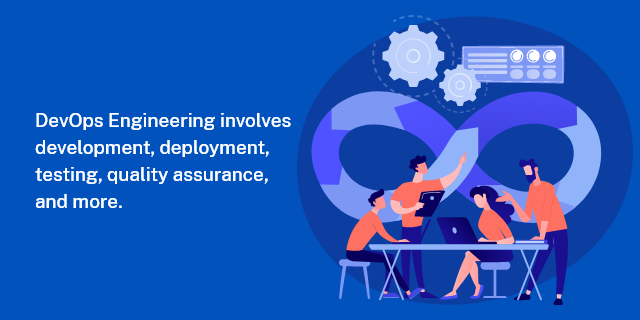
DevOps is a set of practices and philosophies that can be applied to all types of software development that focus on delivering software swiftly and efficiently through a customer-centric approach. DevOps engineering involves development, deployment, testing, quality assurance, and more.
This type of software development focuses on ensuring the delivery of high-quality software, enhancing the development process, and shortening the systems development life cycle. These types of software development jobs have continued to grow in demand as the practice advances.
Required Skills & Tech Stack
Required capabilities include programming, proficiency in DevOps & Agile Principles, integration, scripting, ability to collaborate, QA testing, and more.
5. Security Software Development
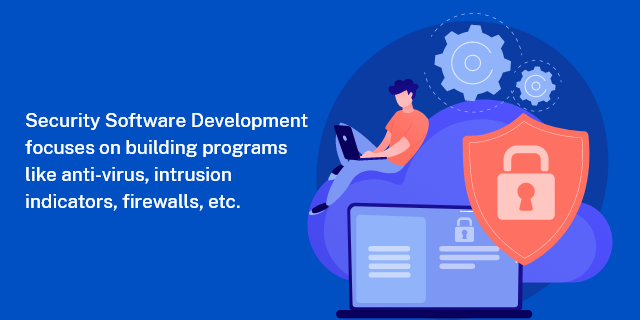
This type of software development focuses on building programs like anti-virus, intrusion indicators, firewalls, etc., that protect networks and devices from cyber attacks. Here, ethical hackers and other cybersecurity professionals work together to create security solutions to guard organizations’ systems and data.
Required Skills & Tech Stack
There is a wide range of skills and technologies required for types of software development involving security. These skills and tech stack are based on operating systems. For instance, skills needed to create security solutions for Linux servers are different from those required to develop a security program for Windows systems. However, source code programming languages like C#, C++, Java, Golang, PHP, Python, Ruby, Typescript/Javascript, etc., are essential.
6. Software Tools Development
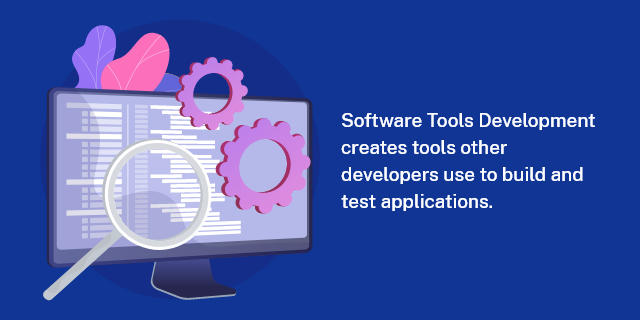
This type of software development creates tools other developers use to build and test applications. Apart from streamlining development processes for developers, software tools help to standardize software development processes. It enables coders to create programs following the industry standards.
Required Skills and Tech Stack
Software tools development requires high-end tech skills and while a general-purpose language might be utilized effectively, opting for a system programming language could potentially yield the best outcomes. The most used system programming languages are C, C++, Golang and Rust.
7. Ecommerce Development

E-commerce development deals with the creation of online shopping platforms - e-commerce websites or mobile applications. The trend of creating online stores is long-lasting in this era of digital transformation.
According to Oberlo, about 33.3% of the world’s population is projected to shop online in 2023. That’s a massive growth from previous years. At present, organizations are investing in software development types that support e-commerce platforms in order to cash in on the e-commerce industry growth.
Required Skills & Tech Stack
Let’s take a look at what it takes to create these types of software development technologies.
- E-commerce Website
The core skills and technologies needed are front-end and back-end development tools. Angular, React, Vue.js, Svelte, HTML, CSS/SCSS/SASS, and Typescript/Javascript, are used for front-end development. On the other hand, back-end development requires server-side technologies like .NET, NodeJS, PHP, Python, Java, etc.
- E-commerce app
Proficiency in Java, Android SDK, Android studio, and so on is required for building e-commerce apps for android mobile. For iOS devices, Apple’s Xcode IDE, Swift, Objective C, etc., are the core technologies used. Cross-platform tools like Flutter, React Native, Framework 7, and Ionic are required to develop an e-commerce application that can run on Android and iOS.
If you want to create an e-commerce platform for your organization, click here to read the story of how we developed a shopping platform for FreshDirect, one of the nation’s leading online grocery brands.
8. Cloud Computing
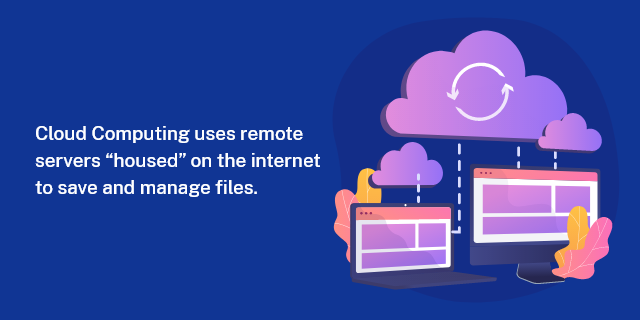
Within the mixture of different types of software development, advancement in cloud infrastructure has caused an explosion in cloud computing development by revolutionizing how individuals and organizations store and manage data. The traditional method of using only local storage for file storage has progressed to include cloud storage.
What is cloud computing? Cloud computing uses remote servers “housed” on the internet to save and manage files. This is unlike the traditional approach of using local servers or on-premise hardware for data storage.
“Simply put, cloud computing is the provision of computing services — including databases, networking, software, servers, storage, analytics, and intelligence — over the Internet (“the cloud”) to offer faster innovation, flexible resources, and economies of scale…,” - Microsoft.
Cloud computing software developers create the programs that run cloud applications like OneDrive storage, Dropbox, Amazon Web services, Microsoft Azure and GitHub. It’s a type of software development that requires high-end skills. Also, building and supporting cloud infrastructure is capital intensive.
Required Skills & Tech Stack
- Programming Skills: From a DevOps perspective, utilizing frameworks like Ansible, Terraform, or recent contender Pulumi or cloud-specific tools such as Bicep and AWS CDK CloudFormation are pivotal for automation and managing Cloud infrastructure.
Platforms like Kubernetes and Docker are indispensable for modern development, ensuring streamlined container orchestration and application deployment. Employing GitOps practices with tools like ArgoCD and Flux ensures precise, automated, and synchronized multi-service deployments, providing a structured and efficient methodology for managing and deploying configurations.
For monitoring and observability, the Grafana Stack, inclusive of Grafana for analytics and monitoring, Grafana OnCall for incident management, and Tempo for tracing, alongside Prometheus for system monitoring, provide a comprehensive overview and control of systems.
Proficiency in programming languages like Python and Bash is essential for scripting and more complex scenarios require knowledge of system languages such as Golang.
AiOps (Artificial Intelligence for IT Operations) is currently an emerging and widely used trend to automate and monitor beyond limits of previous tooling and includes service providers like DataDog, NewRelic, AWS, Azure, etc.
-
Understanding of DevOps principles.
-
Cloud Security: The nature of cloud computing makes it prone to cyber threats. Hackers scour the internet for vulnerable cloud servers. Security software development is a vital skill here.
-
Platform Expertise: There are various leading cloud platforms such as Amazon and Google. The knowledge of how one or more of the major cloud platforms work is necessary.
-
Other crucial skills include maintaining databases, managing an integrated environment, managing a network, etc.
9. Data Science
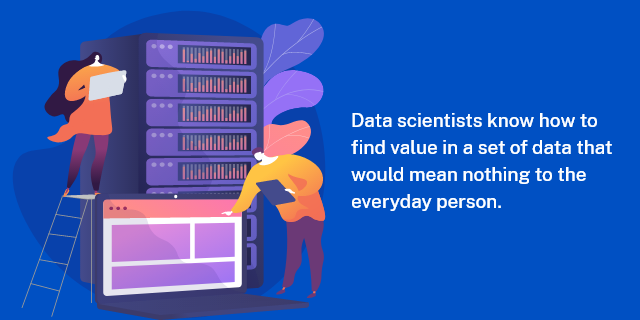
Data scientists use scientific methods, algorithms, and other analytical processes to analyze and draw insights from structured and unstructured data. The knowledge and actionable insights that data scientists get from large data sets can solve problems.
It goes without saying that data is the new gold. Data scientists know how to find value in a set of data that would mean nothing to the everyday person. This analysis and manipulation of loads of data require software-aided analytical approaches.
Required Skills & Tech Stack
The skills required to delve into data science are many, and the same can be said for the types of software development that may be needed to develop a data science solution. That said, here’re some of the critical skills and the software development technology needed:
-
Programming skills
-
Machine Learning
-
Knowledge of Statistics - proficiency in statistics and probability is vital in data science. It enables data scientists to analyze and draw actionable insights
-
Deep Learning
-
Big Data
10. Database Development
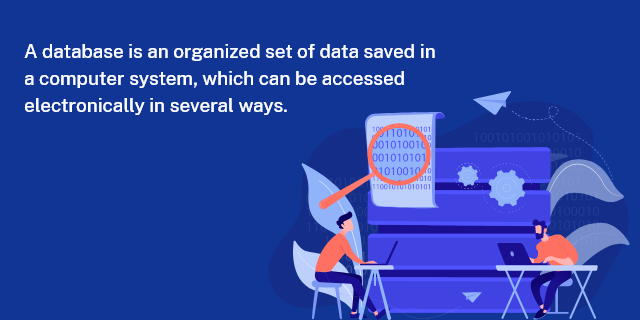
A database is an organized set of data saved in a computer system, which can be accessed electronically in several ways.
Oracle defines a database as: “A database is an organized collection of structured information, or data, typically stored electronically in a computer system. A database is usually controlled by a database management system (DBMS). Together, the data and the DBMS, along with the applications that are associated with them, are referred to as a database system, often shortened to just a database.”
Database development is a type of software development that focuses on building databases and related applications.
Required Skills & Tech Stack
- Database Programming Language: Delving into database development requires proficiency in a database coding language. For relational databases SQL and its extensions is the language of choice. SQL is used to sort and query the data in a database. It’s an essential language when it comes to database development. In addition, it’s used to define and alter data structure.
For non-relational databases it depends on database technology. The most popular NoSQL MongoDB database requires knowledge of MQL language or CQL in case of Apache Cassandra.
-
Database Security: Databases contain sensitive information. As a result, security is a thing of concern. Therefore, a good understanding of database security is necessary to limit access to sensitive data.
-
Data modeling
Read: Key Software Development Metrics For Measuring Success
Out of the 10 types Of Software Development, which is right for you?
What type of software development does your organization need for its next project? And how do you select the right software development consultancy? We can help you decide!
Here at DOOR3, we help our clients develop different types of software development solutions tailored to their business needs. Check out our work here.
We offer:
-
Technology Consulting - whether you’re looking for a more modern software solution or you’re feeling overwhelmed by all the different software development types, you need a trusted technology consulting service to help you make the right decision. We’re here to help!
-
Software Development - we provide a variety of modern software development types of service. Develop your competitive edge with smart, intuitive software solutions built to accelerate your enterprise. Get custom software development and modernizing solutions tailored to your organization’s needs.
-
User Experience Design - we’re a team of UX consultants based in New York City that specializes in creating business and consumer applications to engage real people. Contact us now!
FAQs (Frequently Asked Questions) about Types of Software Development
1. What are the types of software development?
There are various types of software development, including web development, mobile app development, desktop application development, game development, embedded systems development, and more. Each type focuses on different platforms, technologies, and objectives.
2. How many types of software development are there?
There are ten primary types of software development, each catering to specific needs and industries. These include web development, mobile app development, game development, desktop application development, and others.
3. What technologies are used in software development?
Software development relies on a wide range of technologies, including programming languages (such as Java, Python, and JavaScript), frameworks (like React, Angular, and Django), databases (such as MySQL, MongoDB, and PostgreSQL), and tools for version control, testing, and deployment.
4. What are the categories of software development?
Software development can be categorized into various domains, such as web development, mobile app development, enterprise software development, embedded systems development, and emerging areas like artificial intelligence, augmented reality, and Internet of Things (IoT) development.
5. What are the new technologies in software development?
Emerging technologies in software development include artificial intelligence (AI), machine learning (ML), blockchain, augmented reality (AR), virtual reality (VR), Internet of Things (IoT), and edge computing. These technologies are revolutionizing how software is created and utilized across industries.
6. How do I choose the right type of software development for my project?
Choosing the right type of software development depends on various factors, including project requirements, target audience, platform preferences, scalability needs, and budget constraints. Consulting with experienced developers and considering industry best practices can help in making an informed decision.
7. Can you explain the difference between various types of software development?
Each type of software development differs in its target platforms, technologies used, development methodologies, and application domains. For example, web development focuses on creating websites and web applications, while game development involves designing interactive entertainment experiences.
8. Are there any specific industries associated with different types of software development?
Yes, different types of software development are often associated with specific industries based on their applications. For instance, enterprise software development is prevalent in sectors like finance, healthcare, and manufacturing, while game development is prominent in the entertainment industry.
9. What are the key trends shaping the software industry types today?
Key trends in the software industry include the adoption of cloud computing, the rise of artificial intelligence and machine learning, the proliferation of mobile and web-based applications, the growth of cybersecurity measures, and the increasing focus on user experience and accessibility.
10. How can I stay updated with the latest advancements in software development technology?
Staying updated with the latest advancements in software development technology involves continuous learning, engaging with developer communities, attending conferences and workshops, following industry blogs and publications, and exploring online courses and tutorials on relevant topics.

